-

新人教版高中英语必修3Unit 3 Diverse Cultures-Reading for Writing教学设计
The topic of this part is “Describe a place with distinctive cultural identity”.This section focuses on Chinese culture by introducing Chinatown, whose purpose is to show the relationship between the Chinese culture and American culture. The Chinese culture in Chinatown is an important part of American culture. Chinatown is an important window of spreading Chinese culture and the spirit homeland of oversea Chinese, where foreigners can experience Chinese culture by themselves.Concretely, the title is “Welcome to Chinatown!”, from which we can know that the article aims at introducing Chinatown. The author used the “Introduction--Body Paragraph--Conclusion” to describe the people, language, architecture, business, famous food and drinks and people’s activities, which can be a centre for Chinese culture and shows its unique charm.1. Read quickly to get main idea; read carefully to get the detailed information.2. Learn the characteristics of writing and language.3. Learn to introduce your own town according to the text.4. Learn to correct others’ writing.1. Learn the characteristics of writing and language.2. Learn to introduce your own town according to the text.Step 1 Lead in ---Small talkIn the reading part, we mentioned the Chinatown of San Francisco. How much do you know about Chinatown of San Francisco ?Chinatown is a main living place for Chinese immigrants, where you can see many Chinese-style buildings, costumes, operas, restaurants, music and even hear Chinese.Step 2 Before reading ---Predict the contentWhat is the writer’s purpose of writing this text ? How do you know ?From the title(Welcome to Chinatown) and some key words from the text(tourist, visit, visitors, experience), we can know the purpose of the text is to introduce Chinatown and show the relationship between Chinese culture and American culture.

新人教版高中英语必修3Unit 4 Space Exploration-Listening&Speaking&Talking教学设计一
Listening and Speaking introduces the topic of “talking about how to become an astronaut”. This period is aimed to inform students some details about the requirements of being an astronaut. Students can be motivated and inspired by the astronauts. Teachers ought to encourage students to learn from them and let them aim high and dream big.Listening and Talking introduces the theme of "talk about life in space". This part also informs students more details about life in space and can inspire students to be curious about this job. 1. Guide students to listen for numbers concerning dates, years and ages etc2. Cultivate students' ability to talk about how to become an astronaut and life in space ; 3. Instruct students to use functional sentences of the dialogue such as “ first of all, I am not sure, so what might be .. I guess.. I wonder…I am curious…)appropriately.1. Guide students to understand the content of listening texts in terms of the whole and key details; 2. Cultivate students' ability to guess the meaning of words in listening; discuss with their peers how to become a qualified astronaut and describe the life in space.Part 1: Listening and SpeakingStep 1: Lead inPredictionThe teacher can ask students to predict what the listening text is about by looking at the pictures.About how to become an astronaut./the requirements of an astronautStep 2: Then, play the radio which is about an interview a. And after finishing listening for the first time, the students need to solve the following tasks.

新人教版高中英语必修3Unit 4 Space Exploration-Listening&Speaking&Talking教学设计二
The themes of this part are “Talk about how to become an astronaut” and “Talk about life in space”. As Neil Armstrong said “Mystery creates wonder and wonder is the basis of man’s desire to understand. Space is difficult for human to reach, therefore, humans are full of wonders about it. However, if wanting to achieve the dream of reaching the Moon, some of our human should work hard to be an astronaut at first. Part A(Talk about how to become an astronaut) is a radio interview in a radio studio, where the host asked the Chinese astronauts about his story how to become an astronaut. Yang Liwei told his dreamed to be an astronaut since childhood. Then he worked hard to get into college at 22. The next 10 years, he gradually became an experienced pilot. At the same time, to be an astronaut, he had to study hard English, science and astronomy and trained hard to keep in good physical and mental health and to practise using space equipment. Part B (Talk about life in space) is also an interview with the astronaut Brown, who is back on the earth. The host Max asked about his space life, such as his emotion about going back the earth, the eating, shower, brushing, hobbies and his work. Part A and Part B are interviews. So expressing curiosity about the guests’ past life is a communicative skill, which students should be guided to learn.1. Students can get detailed information about how Yang Liwei became an astronaut and Max’s space life.2. Students learn to proper listening strategy to get detailed information---listening for numbers and taking notes.3. Students can learn related sentences or phrases to express their curiosity like “ I wish to know...” “I’d love to know...”4. Students can learn more about the space and astronauts, even be interested in working hard to be an astronaut

新人教版高中英语必修3Unit 4 Space Exploration-Reading for Writing教学设计二
⑦在我看来, 探索太空是值得的。As far as I am concerned, it is worthwhile to explore the space.Step 10 Writing---draftRecently, students in our class have had heated a discussion on whether space is worth exploring. Students hold different ideas about it.30% of us think space exploration is not worthwhile. They think space is too far away from us and our daily life and is a waste of money. And the money spent on space exploration can be used to solve the earth’s problems such as starvation and pollution.On the other hand,70% think space is worth exploring because we have benefited a lot from it,such as using satellites for communication and weather forecast. What’s more,with further space research,we may solve the population problem by moving to other planets one day. Also,space research will enable us to find new sources to solve the problem of energy shortages on the earth.As far as I am concerned, it is worthwhile to explore the space. Not only can it promote the development of society but also enrich our life. Step 11 Pair workExchange drafts with a partner. Use this checklist to help your partner revise his/her draft.1.Does the writer explain why he/she changed/wanted to change?2.Does the writer tell how the changes have improved or will improve his/her life?3.Is the text well-organised?4.Does the writer use words and expressions to show similarities and differences?5.Are there any grammar or spelling errors?6.Does the writer use correct punctuation?

新人教版高中英语必修3Unit 5 The Value of Money- Discovering Useful Structure教学设计
Step 3 Meaning1. 过去将来时表示从过去某一时间来看将要发生的动作或存在的状态, 常用在宾语从句中。一般由“would/should +动词原形”构成。She hoped that they would meet again someday. 她希望将来有一天他们能再见面。2. was/were going to+动词原形: 表示过去将要发生或很有可能发生的动作, 常用于口语中, 表示预言、意图或者打算等。He was going to start work the following week. 他打算下星期开始工作。3. was/were about to do: 常用来表示即将发生的动作, “刚要/正要做……”。注意该结构不与任何时间状语连用。I felt that something terrible was about to happen. 我感到某种可怕的事情即将发生。4.was/were to do: 表示“曾计划做某事”, 如果表示“本来计划做某事, 动作没实现”, 则需用 “was/were to have done”。She said she was to have told me about the accident. 她说她本来想告诉我关于事故的事。5.Start, go, come, leave, see, meet等动词的过去进行时: 表示就过去某一时刻而言即将发生的动作。She was coming later. 她随后就来。I had just put on my overcoat and was leaving to visit a friend of mine. 我刚穿上外套要去看我的一个朋友。

新人教版高中英语必修3Unit 5 The Value of Money-Listening &Speaking教学设计
Step 4: Listen again and decide if the following statements are true (T) or false (F).1 It was the first time Chen Liyan's story was reported. T口 F口2 Chen found 10,000 yuan in a small plastic bag in Taiyuan railway station口 F口3 Wang Zheng apologized to Chen because he couldn't offer her more money. T口 F口4 Chen took out a large loan to cure her daughter, T口 F口5 Wang set up a fundraising website for Chen's daughter after Chen told him about her situation. T口 F口Step 5:After listening, discuss the questions.1 What kind of person do you think Chen Liyan is?Chen Liyan is generous and honest because she returned a large sum of money to the owner.2 Did Chen return the money because she didn't need it?No. She returned the money because it was the right thing to do. Evidence for this is that she refused to accept the reward money because she felt that it had not been earned. 3 Is it common for people to do what Chen did?It depends on the culture. In some countries it is quite common to return money that has been found. In other countries, people believe "Finders are keepers!" 4 How did Wang Zheng feel about the return of his money?He must have been very happy and relieved to have gotten his money back. We know this because he thanked Chen repeatedly and even offered her a reward.5 Why did Ma Dongbao tell Wang about Chen's family?He must have had great sympathy for Chen and her daughter and wanted to help them.'We know this because he arranged help for them. 6 How did the news reporter feel about Chen's actions?The news reporter felt that it showed that money wasn't the most important thing in life. We know this because the reporter told us that this is what Chen believes. and then said, “that's a great attitude to take."

新人教版高中英语必修3Unit 5 The Value of Money-Reading and Thinking教学设计一
Everybody wants to get wealth.In today’s material world,making money or becoming wealthy symbolizes a person’s success and capability. Many people just make every effort, pay any price to attain greater wealth. With money,they can buy nice, large apartments in nice neighborhood. With money they can own luxurious cars. Wealth seems to bring all happiness in life.But is wealth the only road to happiness? Not really. There are many things in the world, which are beyond the means of money, such as friendship, love, health and knowledge. People are so preoccupied with struggling for money that they have no time or would not take the time to form or maintain friendship. What happiness can they feel living as lonely miserable creatures without love or friends in the world even if they accumulate tremendous wealth?In my opinion, people can’t do anything without money, but money is not everything. What money will bring you depends on your personal belief and goal in life. If you are kind enough to help others, especially the poor, money is a good thing to you. With it, you can do much more for the benefit of people and your country, and it will add to your own happiness. If you want money just for your own needs, you’ll never be satisfied or happy. In a word,you should have money spent for more people. Only then can money be the source of your happiness.Step 8 Homework4 students in a group, one acts Roderick, one Oliver, one servant and the fourth one acts Henry Adams, then listen to the tape, pay more attention to the difference between American English and British English in pronunciation, stress, tone.

新人教版高中英语选修2Unit 4 Journey Across a Vast Land教学设计
当孩子们由父母陪同时,他们才被允许进入这个运动场。3.过去分词(短语)作状语时的几种特殊情况(1)过去分词(短语)在句中作时间、条件、原因、让步状语时,相当于对应的时间、条件、原因及让步状语从句。Seen from the top of the mountain (=When it is seen from the top of the mountain), the whole town looks more beautiful.从山顶上看,整个城市看起来更美了。Given ten more minutes (=If we are given ten more minutes), we will finish the work perfectly.如果多给十分钟,我们会完美地完成这项工作。Greatly touched by his words (=Because she was greatly touched by his words), she was full of tears.由于被他的话深深地感动,她满眼泪花。Warned of the storm (=Though they were warned of the storm), the farmers were still working on the farm.尽管被警告了风暴的到来,但农民们仍在农场干活。(2)过去分词(短语)在句中作伴随、方式等状语时,可改为句子的并列谓语或改为并列分句。The teacher came into the room, followed by two students (=and was followed by two students).后面跟着两个学生,老师走进了房间。He spent the whole afternoon, accompanied by his mom(=and was accompanied by his mom).他由母亲陪着度过了一整个下午。

新人教版高中英语选修2Unit 5 First Aid-Discovering useful structures教学设计
You have no excuse for not going.你没有理由不去。He was punished for not having finished his homework.他因未完成作业而受到惩罚。2.动词ing形式复合结构由物主代词或人称代词宾格、名词所有格或普通格加动词ing,即“sb./sb.'s+doing”构成。动词ing形式的复合结构实际上是给动词ing形式加了一个逻辑主语。动词ing形式的复合结构有四种形式:①形容词性物主代词+动词ing②名词所有格+动词ing③代词宾格+动词ing④名词+动词ingHer coming to help encouraged all of us.她来帮忙鼓舞了我们所有人。The baby was made awake by the door suddenly shutting.这个婴儿被突然的关门声吵醒了。Can you imagine him/Jack cooking at home?你能想象他/杰克在家做饭的样子吗?无生命名词无论是作主语还是作宾语都不能用第②种形式。Tom's winning first prize last year impressed me a lot.汤姆去年得了一等奖使我印象深刻。Do you mind my/me/Jack's/Jack leaving now?你介意我/杰克现在离开吗?Excuse me for my not coming on time.很抱歉我没能按时来。His father's being ill made him worried.他父亲病了,他很担心。We are looking forward to the singer's/the singer to give us a concert.我们盼望着这位歌手来给我们举办一场演唱会。
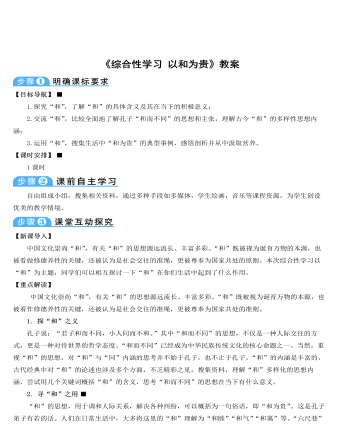
部编版语文八年级下册《综合性学习:以和为贵》教案
【目标导航】1.探究“和”,了解“和”的具体含义及其在当下的积极意义;2.交流“和”,比较全面地了解孔子“和而不同”的思想和主张,理解古今“和”的多样性思想内涵;3.运用“和”,搜集生活中“和为贵”的典型事例,感悟剖析并从中汲取营养。【课时安排】1课时自由组成小组,搜集相关资料,通过多种手段如多媒体,学生绘画,音乐等课程资源,为学生创设优美的教学情境。【新课导入】中国文化崇尚“和”,有关“和”的思想源远流长、丰富多彩。“和”既被视为诞育万物的本源,也被看做修德养性的关键,还被认为是社会交往的准绳,更被尊奉为国家共处的原则。本次综合性学习以“和”为主题,同学们可以相互探讨一下“和”在你们生活中起到了什么作用。
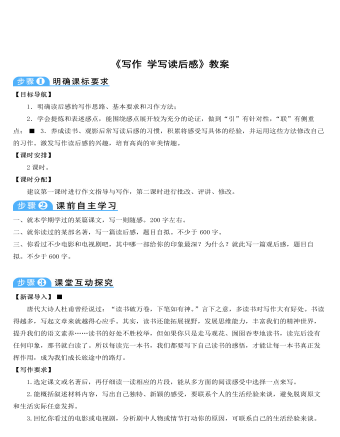
部编版语文八年级下册《写作:学写读后感》教案
【新课导入】唐代大诗人杜甫曾经说过:“读书破万卷,下笔如有神。”言下之意,多读书对写作大有好处。书读得越多,写起文章来就越得心应手。其实,读书还能拓展视野,发展思维能力,丰富我们的精神世界,提升我们的语文素养……读书的好处不胜枚举,但如果你只是走马观花、囫囵吞枣地读书,读完后没有任何印象,那书就白读了。所以每读完一本书,我们都要写下自己读书的感悟,才能让每一本书真正发挥作用,成为我们成长旅途中的路灯。【写作要求】1.选定课文或名著后,再仔细读一读相应的片段,能从多方面的阅读感受中选择一点来写。2.能概括叙述材料内容,写出自己独特、新颖的感受,要联系个人的生活经验来谈,避免脱离原文和生活实际任意发挥。3.回忆你看过的电影或电视剧,分析剧中人物或情节打动你的原因,可联系自己的生活经验来谈。【技法点拨】
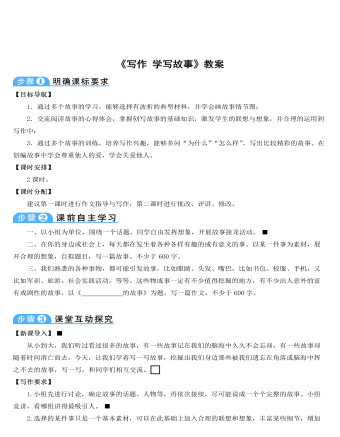
部编版语文八年级下册《写作:学写故事》教案
【目标导航】1.通过多个故事的学习,能够选择有波折的典型材料,并学会画故事情节图;2.交流阅读故事的心得体会,掌握创写故事的基础知识,激发学生的联想与想象,并合理的运用到写作中;3.通过多个故事的训练,培养写作兴趣,能够多问“为什么”“怎么样”,写出比较精彩的故事。在创编故事中学会尊重他人的爱,学会关爱他人。一、以小组为单位,围绕一个话题,同学自由发挥想象,开展故事接龙活动。二、在你的身边或社会上,每天都在发生着各种各样有趣的或有意义的事。以某一件事为素材,展开合理的想象,自拟题目,写一篇故事。不少于600字。三、我们熟悉的各种事物,都可能引发故事,比如眼睛、头发、嘴巴,比如书包、校服、手机,又比如军训、旅游、社会实践活动,等等。这些物或事一定有不少值得挖掘的地方,有不少出人意外的富有戏剧性的故事。以《 的故事》为题,写一篇作文。不少于600字。
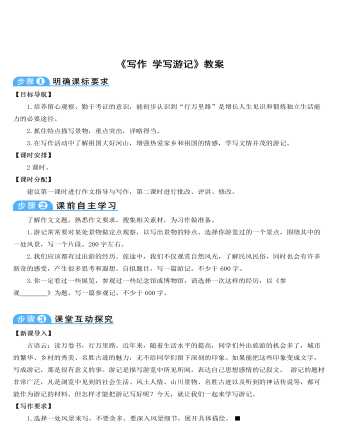
部编版语文八年级下册《写作:学写游记》教案
【目标导航】1.培养留心观察、勤于考证的意识,能初步认识到“行万里路”是增长人生见识和锻炼独立生活能力的必要途径。2.抓住特点描写景物,重点突出,详略得当。3.在写作活动中了解祖国大好河山,增强热爱家乡和祖国的情感,学写文情并茂的游记。【课时安排】2课时。【课时分配】建议第一课时进行作文指导与写作,第二课时进行批改、评讲、修改。了解作文文题,熟悉作文要求,搜集相关素材,为习作做准备。1.游记常常要对某处景物做定点观察,以写出景物的特点。选择你游览过的一个景点,围绕其中的一处风景,写一个片段。200字左右。2.我们应该都有过出游的经历。旅途中,我们不仅观赏自然风光,了解民风民俗,同时也会有许多新奇的感受,产生很多思考和遐想。自拟题目,写一篇游记。不少于600字。3.你一定看过一些展览,参观过一些纪念馆或博物馆,请选择一次这样的经历,以《参观 》为题,写一篇参观记。不少于600字。
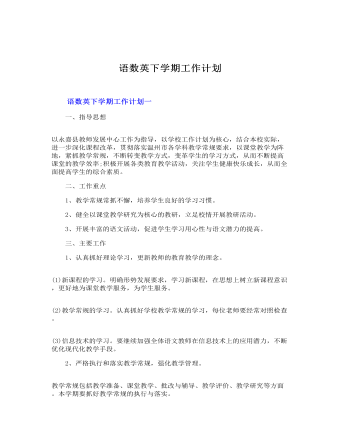
语数英下学期工作计划
二、工作重点 1、教学常规常抓不懈,培养学生良好的学习习惯。 2、健全以课堂教学研究为核心的教研,立足校情开展教研活动。 3、开展丰富的语文活动,促进学生学习用心性与语文潜力的提高。
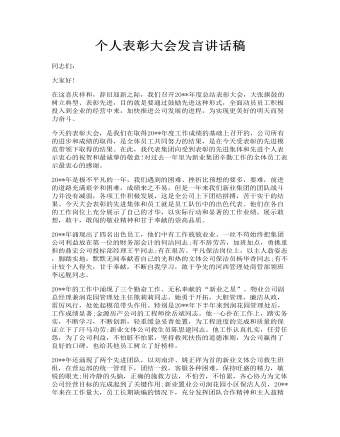
个人表彰大会发言讲话稿
20**年是极不平凡的一年,我们遇到的困难、挫折比预想的要多,要难,前进的道路充满艰辛和困难,成绩来之不易,但是一年来我们新业集团的团队战斗力并没有减弱,各项工作积极发展,这是全公司上下团结拼搏,苦干实干的结果。今天大会表彰的先进集体和员工就是员工队伍中的出色代表。他们在各自的工作岗位上充分展示了自己的才华,以实际行动和显著的工作业绩,展示敢想,敢干,敢闯的敬业精神和甘于奉献的崇高品质。
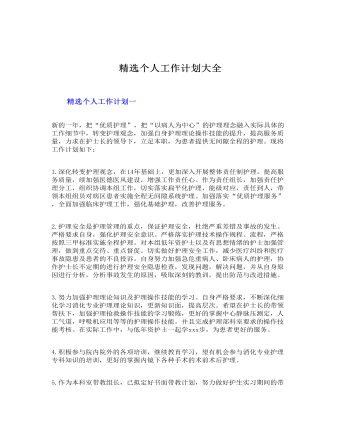
精选个人工作计划大全
1.深化转变护理观念,在14年基础上,更加深入开展整体责任制护理。提高服务质量,续加强医德医风建设,增强工作责任心。作为责任组长,加强责任护理分工,组织协调本组工作,切实落实扁平化护理,能级对应,责任到人,带领本组组员对病区患者实施全程无间隙系统护理。加强落实“优质护理服务”,全面加强临床护理工作,强化基础护理,改善护理服务。
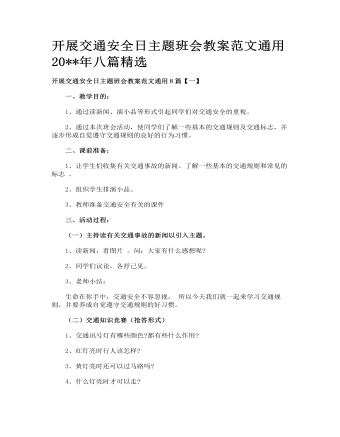
开展交通安全日主题班会教案范文通用八篇精选
骑自行车的交通安全 我国是自行车大国,许多年满12周岁的同学都骑自行车上学,骑自行车应注意哪些问题呢?下面请听一名同学朗诵《安全骑车歌》。 安全骑车歌 同学们骑自行车,听我唱段安全歌。 车铃好使闸要灵,有了情况车能停。 上街注意看信号,千万不要冒险行。 信号就是指挥员,骑车第一讲安全。 看见红灯快刹闸,该等多久等多久。 绿灯亮了才能行,安全通行不争抢。 十字路口人车多,左右观察听八方。 骑车带人危险大,攀扶车辆更可怕。 中速骑车靠右侧,分道行驶路畅通。 骑车拐弯要示意,不能猛拐一溜风。 手拉手儿把肩摸,十有八、九要撞车。 双手离把更不行,撞上汽车命归西。 骑车不走一条线,东摇西摆像醉汉。 不定哪天出事故,头破血流住医院。 驮载东西别超宽,超高超长也危险。 骑车让让讲安全,事情虽小不平凡。
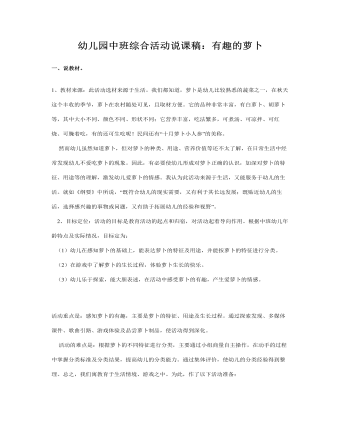
幼儿园中班综合活动说课稿:有趣的萝卜(附教案)
2、目标定位:活动的目标是教育活动的起点和归宿,对活动起着导向作用。根据中班幼儿年龄特点及实际情况,目标定为: (1)幼儿在感知萝卜的基础上,能表达萝卜的特征及用途,并能按萝卜的特征进行分类。 (2)在游戏中了解萝卜的生长过程,体验萝卜生长的快乐。 (3)幼儿乐于探索,能大胆表述,在活动中感受萝卜的有趣,产生爱萝卜的情感。活动重点是:感知萝卜的有趣,主要是萝卜的特征、用途及生长过程。通过探索发现、多媒体课件、歌曲引路、游戏体验及品尝萝卜制品,使活动得到深化。 活动的难点是:根据萝卜的不同特征进行分类,主要通过小组商量自主操作,在动手的过程中掌握分类标准及分类结果,提高幼儿的分类能力。通过集体评价,使幼儿的分类经验得到整理。总之,我们寓教育于生活情境、游戏之中。为此,作了以下活动准备: 1、小兔子玩具、各种萝卜、篮子每桌一套、多媒体课件、萝卜食品、轻音乐。 2、幼儿对蔬菜有一定的经验(吃过或看过)二、说教法。 新《纲要》指出:“教师应成为学习活动的支持者、合作者、引导者。”活动中应力求“形成合作探究式”的师幼互动。因此,本次活动我除了以自己的情绪、形态感染幼儿外,还挖掘其综合活动价值,采用了适宜的方法组织教学,采用的教法有: 1、操作法:本次活动安排了两次操作活动。第一次是引起兴趣后第一次操作,主要是探索萝卜的趣味性、多样性,让幼儿在看一看、摸一摸、比一比中获得感知。第二次操作是对萝卜进行分类。幼儿分类是指幼儿把具有一个或几个共同特征的物体聚集在一起的活动,分类活动是观察活动的延伸和应用。 2、游戏法:本次活动的第三环节中,我就引导幼儿扮演萝卜籽,共同体验萝卜生长的快乐。由于我利用了节奏快的旋律巧填歌词,编成了一首《萝卜歌》,这给游戏活动注入了新的活力。孩子在表演的过程中不仅理解了萝卜的生长过程,更创造了一个个可爱的萝卜形象。 3、演示法:本次活动中的演示法是通过制作多媒体动画“萝卜的生长过程”,让幼儿对萝卜生长有全新的认识,在这一过程中,现代教学辅助手段的运用发挥了传统教育手段不可替代的功能,使理解和认识更透彻。 4、情境教学法:在教学过程中教师有目的地引入或创设具有一定情绪色彩的形象,为主体的生动活动提供具体的场景,以引起孩子一定的态度体验,使孩子心理机能得到发展的方法。 本次活动的全过程,我就引入了幼儿喜欢的兔子形象,结合秋收,引发幼儿融入到看萝卜、分萝卜、品尝萝卜的情境中,使幼儿主动探究,积极思维,达到科学素质的提高与个性发展的统一。
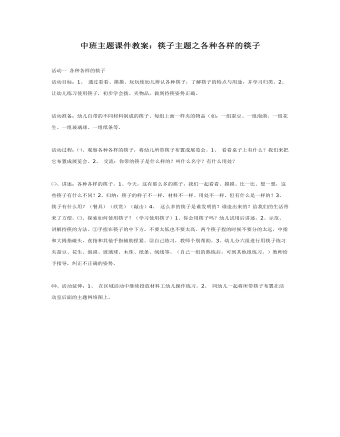
中班主题课件教案:筷子主题之各种各样的筷子
活动目标:1、通过看看、摸摸、玩玩使幼儿辨认各种筷子,了解筷子的特点与用途,并学习归类。2、让幼儿练习使用筷子,初步学会拨、夹物品,做到持筷姿势正确。活动准备:幼儿自带的不同材料制成的筷子、每组上面一样夹的物品(如:一组蚕豆、一组泡漠、一组花生、一组玻璃球、一组纸条等。活动过程:㈠、观察各种各样的筷子,将幼儿所带筷子布置成展览会。1、看看桌子上有什么?我们来把它布置成展览会。2、交流:你带的筷子是什么样的?叫什么名字?有什么用处?

人教版高中政治必修4第九课唯物辩证法的实质和核心精品教案
a矛盾的同一性是矛盾双方相互吸引、相互联结的属性和趋势。它有两方面的含义:一是矛盾双方相互依赖,一方的存在以另一方的存在为前提,双方共处于一个统一体中;同一事物都有对立面和统一面两个方面,一方的存在以另一方为条件,彼此谁都离不开谁(形影想随、一个巴掌拍不响、不是冤家不聚头)。【举例】P67漫画:他敢剪吗?悬挂在山崖上的两个人构成一种动态的平衡。【举例】磁铁(S极和N极);没有上就没有下、没有香就没有臭、没有福就无所谓祸;【举例】父子关系(父亲之所以是父亲,因为有儿子,儿子之所以是儿子,因为有父亲);师生关系;二是矛盾双方相互贯通,即相互渗透、相互包含,在一定条件下可以相互转化。 【相关衔接】P68生物变性现象,雌雄转化现象【举例】生产与消费具有直接统一性

